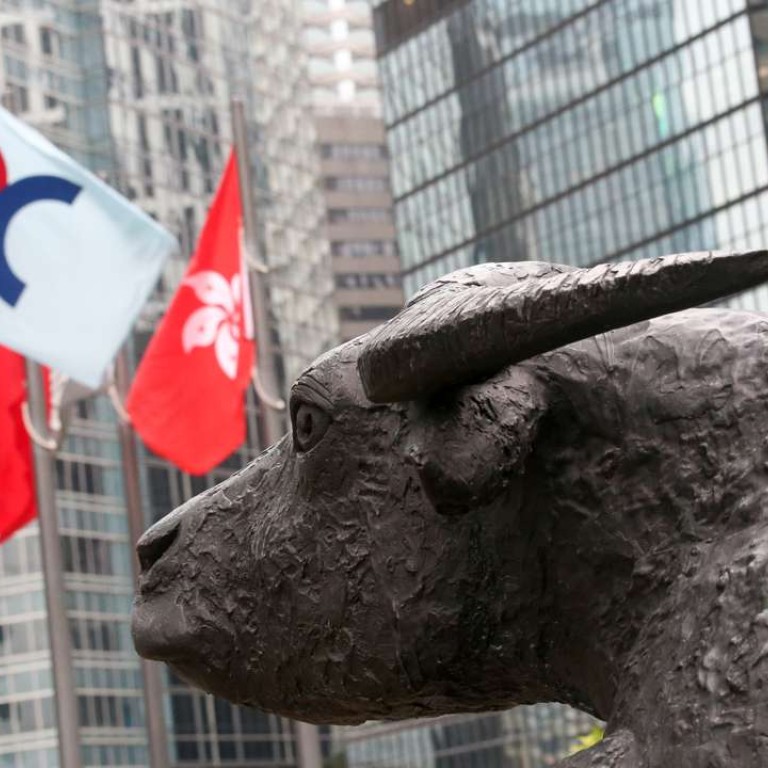
Update | Hong Kong, mainland China stocks close higher on rallies in financial, property sectors after early losses
Hong Kong and mainland Chinese stocks closed higher on Wednesday amid strong rallies in the financial and property sectors despite news that China’s foreign exchange reserves fell to a nearly six-year low, which had hit market sentiment during morning trading.
The Hang Seng Index gained 0.66 per cent, or 153.56 points, to close at 23,485.13 after falling to 23,310.29 during morning trading, ending the day at a three and a half month high, while the Hang Seng China Enterprises index also bucked the downward trend from morning session to close 1.11 per cent higher at 9,955.34.
Rising capital inflows was a bright spot on the Hong Kong bourse as the Shanghai-Hong Kong Stock Connect saw more than 14 per cent of its daily southbound quota used on Wednesday.
“It is a special day for the two markets,” said Kingston Lin King-ham, director at securities brokerage AMTD. “The indices totally reversed the downward trend during morning trading and started rising even when there was no exciting market news.”
The indices totally reversed the downward trend during morning trading and started rising even when there was no exciting market news
He expects Hong Kong stocks to maintain their rising trend for the next two days while mainland Chinese stocks should be stable, adding that it’s possible the Hang Seng index could pass the key 23,500 threshold as more mainland funding continued to flow into the Hong Kong market.
“People now want to put the bonuses and dividends they earned before the Lunar New Year holiday into stock markets and that’s part of the reason we have seen larger turnover recently,” Lin said.
Mainland Chinese shares also rebounded from morning losses. The Shanghai Composite Index gained 0.44 per cent or 13.89 points to 3,166.98 while the blue-chip CSI 300 added 0.52 per cent or 17.60 points to close at 3,383.29.
The Shenzhen Component Index gained 0.74 per cent or 74.56 points to finish at 10,130.12 and the Nasdaq-style ChiNext gained 0.77 per cent or 14.49 points to 1,903.63.
In January, China’s foreign exchange reserves fell below US$3 trillion for the first time since early 2011, official data showed on Tuesday.
China Resources Land surged 7.0 per cent to HK$20.75 while China Overseas rallied 5.24 per cent to HK$24.1. Hong Kong property investment giant Link Reit rose 2.07 per cent to HK$54.25.
Energy stocks continued their falls on lower global oil prices. PetroChina was down 0.17 per cent to HK$6.04 while CNOOC dropped 1.24 per cent to HK$9.53.
The People’s Bank of China set the yuan reference point against the US dollar at 6.8849, 245 basis points weaker than Tuesday and the weakest since January 17. The onshore exchange rate is allowed to move up to 2 per cent either side of the reference point daily.
The Chinese central bank also said it would skip open market operations and not inject cash into the banking system for a fourth trading day, reinforcing its tightening bias.
Overnight in the US, the Nasdaq composite closed at a record high after a 0.19 per cent rise to 5,674.22. The Dow Jones Industrial Average closed 0.19 per cent up to 20,090.29 after hitting an intraday all-time high.
The S&P 500 climbed 0.02 per cent to 2,293.08, its gains limited by energy giants. Oil prices further declined after data showed an increase in US inventories.
Other Asian markets closed mixed on Wednesday. Tokyo’s Nikkei 225 gained 0.5 per cent to close at 19,007 following positive market sentiment buoyed by company earnings announcements. Australia’s S&P/ASX 200 gained 0.52 per cent to 5,651.40 while South Korea’s Kospi dropped 0.5 per cent to close at four week low of 2,065.


